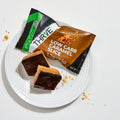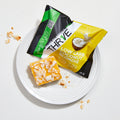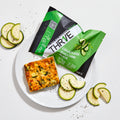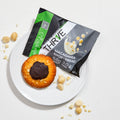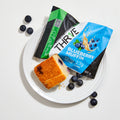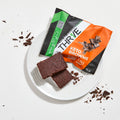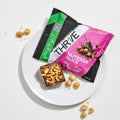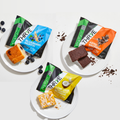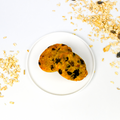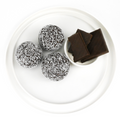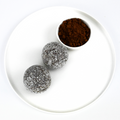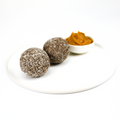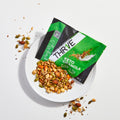Australia: it’s the birthplace of avo toast and the home of the sun-soaked brunch. Yet, according to Australian Bureau of Statistics data, 12.3% of Aussie adults skip breakfast. 19-30 year olds are the biggest breakfast avoiders, with 21.2% skipping brekkie on the reg.
 3 Science-Backed Benefits of Brekkie
3 Science-Backed Benefits of Brekkie
1. It can protect your arteries. Err, what? Alarmingly, skipping brekkie is associated with an increased risk of atherosclerosis – this is the hardening and narrowing of arteries due to a build-up of plaque. In a 2017 study, researchers found atherosclerosis was observed more frequently in participants who skipped brekkie. These participants also had the greatest waist circumference, body mass index and blood pressure. In general, they were also more likely to have an overall unhealthy lifestyle. “Aside from the direct association with cardiovascular risk factors, skipping breakfast might serve as a marker for a general unhealthy diet or lifestyle which in turn is associated with the development and progression of atherosclerosis,” said Dr Jose Peñalvo, senior author of the study. This study can’t prove cause and effect – but it is still a useful observation.
2. It can help you be more active. A UK study analysed the impact of eating a morning meal on individuals classified as obese. One group ate brekkie and one group skipped it. They found that while eating breakfast didn’t make the participants lose weight, it did result in more physical activity in the morning and reduced food intake later in the day. This meant both groups ate similar amounts overall by the end of the day. Yep, turns out the morning meal can truly can put a pep in your step!
3. A big breakfast can trim your waistline. Eating more sounds counterintuitive, but the science backs it up. A University of Tel Aviv study found those who eat their largest daily meal at breakfast are more likely to lose weight and waistline circumference than those who eat a big dinner. In the study, the big breakfast group ate 700 cals at brekkie, 500 at lunch and 200 at dinner. The other group switched this around, so 200 at brekkie, 500 at lunch and 700 at dinner. At the end of the 12-week study, the big breakfast group had lost an average of eight kilos, while the big dinner group had lost an average of 3.3 kilos. Most importantly, the big breakfast group had lost over 4cm more, on average, off their waistline. Fun fact: the brekkie group got a “dessert item” during brekkie – whereas the other group had it with dinner. Yeah, we’re now campaigning to make breakfast dessert a thing.
What do you do if you love breakfast but want to try fasting?
Intermittent fasting (IF) has grown in popularity. And for good reason – it offers up a range of potential benefits, including reduced hunger swings, weight loss and improved insulin sensitivity. Yet, practicing fasting and eating a good morning meal don’t have to be mutually exclusive.
One of the most popular forms of IF is time-restricted feeding (TRF), which means that you simply reduce the amount of hours you’re eating on any given day. Typically, this is in a 16:8 pattern – you can eat for eight hours and fast overnight for 16 hours. A recent study from the University of Illinois found that fasting in this pattern can be an effective tool to reduce weight and lower blood pressure. In this case, you don’t need to skip breakfast entirely – just delay it a little.
In fact, if you’re ravenous first thing in morning – you can still eat brekkie and do IF. In early-time restricted feeding (eTRF – yep, there’s an acronym for everything!), you eat breakfast at your regular time, but just eat your last meal mid-afternoon. The body has an internal clock and indeed many aspects of metabolism function best in the morning. A study at the Pennington Biomedical Research Center found that eating between 8am and 2pm reduced swings in hunger and altered fat and carb burning patterns, which can help with weight loss, if that’s the desired outcome.
As always, it’s important to note that fasting isn’t right for everyone and should always be done under guidance from a health professional – especially if you have any pre-existing conditions.
Should You Eat Breakfast Before Working Out?
The research on this is very contradictory. Recent research from the University of Bath found that eating breakfast before exercise may prime the body to burn carbs during exercise and more rapidly metabolise food afterwards. The study compared the effect of eating breakfast versus fasting overnight before an hour’s cycling. “We found that, compared to skipping breakfast, eating breakfast before exercise increases the speed at which we digest, absorb and metabolise carbohydrate that we may eat after exercise,” said Dr Javier Gonzalez, senior lecturer in the Department of Health who co-led the study. “We also found that breakfast before exercise increases carbohydrate burning during exercise, and that this carbohydrate wasn’t just coming from the breakfast that was just eaten, but also from carbohydrate stored in our muscles as glycogen,” said Rob Edinburgh, who also co-led the study.
However, earlier studies have found that exercising in the morning on an empty stomach may help burn up to 20% more body fat and can also have a positive effect on fat tissue. Caveat: most of these studies appear to have been done in men only, so these findings could vary in women, too.
Considering this – and the somewhat contradictory research – it’s really a question of what works for you. Ask the question: if you train fasted, do you have enough energy and drive to get through your workout and feel the benefits? If so, then continue as normal – then eat a decent breakfast when you’re hungry afterwards. If you can’t make it through that HIIT class – then eat beforehand.
That’s it for our guide to breakfast! Hungry? Check out these easy café-style brekkie recipes!

 3 Science-Backed Benefits of Brekkie
3 Science-Backed Benefits of Brekkie





